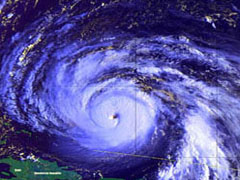|
HURRICANES
Hurricanes and tropical storms are cyclones with tropical origins (tropical cyclones). When the winds of a tropical
storm (winds 39 to 73 miles per hour) reach a constant speed of 74 miles per hour or more, it is called a hurricane. Hurricane winds blow in a large spiral around a relatively calm
center known as the "eye." The "eye" is generally 20 to 30 miles wide, and the storm may have a diameter of 400 miles across. As a hurricane approaches, the skies will begin to
darken and winds will grow in strength. A hurricane can bring torrential rains, high winds, and storm surge as it nears land. A single hurricane can last for more than two weeks over
open waters and can run a path across the entire length of the eastern seaboard.
During a hurricane, homes may be damaged by high winds and high waves. Debris can break windows and doors, allowing
high winds inside the home. In extreme storms, such as Hurricane Andrew, the force of the wind alone can cause weak places in your home to fail. Remember that hurricanes
deliver torrential rains which often cause flooding and sometimes trigger landslides. In addition, hurricanes can spawn tornados, which add to the destructiveness of the storm.
Here's what you can do to prepare for such an emergency.
 KNOW WHAT HURRICANE WATCH AND WARNING MEAN KNOW WHAT HURRICANE WATCH AND WARNING MEAN
- WATCH: Hurricane conditions are possible in the specified area of the WATCH, usually within 36 hours.
- WARNING: Hurricane conditions are expected in the specified area of the WARNING, usually within 24 hours.
 PREPARE A PERSONAL EVACUATION PLAN PREPARE A PERSONAL EVACUATION PLAN
- Identify ahead of time where you could go if you are told to evacuate. Choose several places--a friend's
home in another town, a motel, or a shelter.
- Keep handy the telephone numbers of these places as well as a road map of your locality. You may need to
take alternative or unfamiliar routes if major roads are closed or clogged.
- Listen to NOAA Weather Radio or local radio or TV stations for evacuation instructions. If advised to evacuate, do so immediately.
  ASSEMBLE A DISASTER SUPPLIES KIT INCLUDING THE
FOLLOWING ITEMS: ASSEMBLE A DISASTER SUPPLIES KIT INCLUDING THE
FOLLOWING ITEMS:
- First aid kit and essential medications.
- Canned food and can opener.
- At least three gallons of water per person.
- Protective clothing, rainwear, and bedding or sleeping bags.
- Battery-powered radio, flashlight, and extra batteries.
- Special items for infants, elderly, or disabled family members.
- Written instructions on how to turn off electricity, gas and water if
authorities advise you to do so. (Remember, you'll need a professional to turn them back on.)
 PREPARE FOR HIGH WINDS PREPARE FOR HIGH WINDS
- Install hurricane shutters or purchase precut 1/2" outdoor plywood boards for
each window of your home. Install anchors for the plywood and predrill holes in the plywood so that you can put it up quickly.
- Make trees more wind resistant by removing diseased and damaged limbs,
then strategically removing branches so that wind can blow through.
 KNOW WHAT TO DO WHEN A HURRICANE WATCH IS ISSUED KNOW WHAT TO DO WHEN A HURRICANE WATCH IS ISSUED
- Listen to NOAA Weather Radio or local radio or TV stations for up-to-date storm information.
- Prepare to bring inside any lawn furniture, outdoor decorations or ornaments,
trash cans, hanging plants, and anything else that can be picked up by the wind.
- Prepare to cover all windows of your home. If shutters have not been installed, use precut plywood as described above. Note: Tape does not
prevent windows from breaking, so taping windows is not recommended.
- Fill your car's gas tank.
- Recheck manufactured home tie-downs.
- Check batteries and stock up on canned food, first aid supplies, drinking water, and medications.
 KNOW WHAT TO DO WHEN A HURRICANE WARNING IS ISSUED KNOW WHAT TO DO WHEN A HURRICANE WARNING IS ISSUED
- Listen to the advice of local officials, and leave if they tell you to do so.
- Complete preparation activities.
- If you are not advised to evacuate, stay indoors, away from windows.
- Be aware that the calm "eye" is deceptive; the storm is not over. The worst
part of the storm will happen once the eye passes over and the winds blow from the opposite direction. Trees, shrubs, buildings, and other objects
damaged by the first winds can be broken or destroyed by the second winds.
- Be alert for tornadoes. Tornadoes can happen during a hurricane and after it
passes over. Remain indoors, in the center of your home, in a closet or bathroom without windows.
- Stay away from flood waters. If you come upon a flooded road, turn around
and go another way. If you are caught on a flooded road and waters are rising rapidly around you, get out of the car and climb to higher ground.
 KNOW WHAT TO DO AFTER A HURRICANE IS OVER KNOW WHAT TO DO AFTER A HURRICANE IS OVER
- Keep listening to NOAA Weather Radio or local radio or TV stations for instructions.
- If you evacuated, return home when local officials tell you it is safe to do so.
- Inspect your home for damage.
- Use flashlights in the dark; do not use candles.
|









